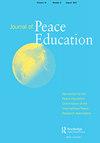Shinrin yoku as a pedagogy for peace amidst violence: generating dynamic narratives of Palestine-Israel relations on college campuses
IF 1.3
Q3 EDUCATION & EDUCATIONAL RESEARCH
引用次数: 0
Abstract
ABSTRACT Amidst violent conflict over Palestine-Israel relations at colleges across America, how might we use our classrooms and campus landscapes to generate dynamic narratives that facilitate peace? Moving beyond a chronological ordering of events, a narrative is a constructed cohesive account of occurrences used to make sense of experiences and motivate action. In violent settings, narratives tend to retrench into static accounts that increase prejudice and motivate greater acts of violence. Alternatively, dynamic narratives offer complex judgement, plot, character, and value assessments of the world thus encouraging more openness to others and peace. I propose a novel intervention for the generation of dynamic narratives. I use the practice of shinrin yoku or guided forest walks in a seminar about Palestine and Israel, to invite liminality, the experience of communal spaces where traditional markers of power and social obligations are stripped. I expected that increasing experiences of shinrin yoku, and in turn liminality, will induce dynamic understandings of Palestinian Israeli relations on campus. Digital diary responses from eleven student participants kept over twelve weeks in a Fall 2022 seminar reveal that even with the eruption of hostilities, 1 students adopted dynamic stories about Palestine and Israel relations when they spent increasing time engaged in shinrin yoku.Shinrin yoku作为暴力中的和平教学法:在大学校园中产生巴以关系的动态叙述
本文章由计算机程序翻译,如有差异,请以英文原文为准。
求助全文
约1分钟内获得全文
求助全文

 求助内容:
求助内容: 应助结果提醒方式:
应助结果提醒方式:


